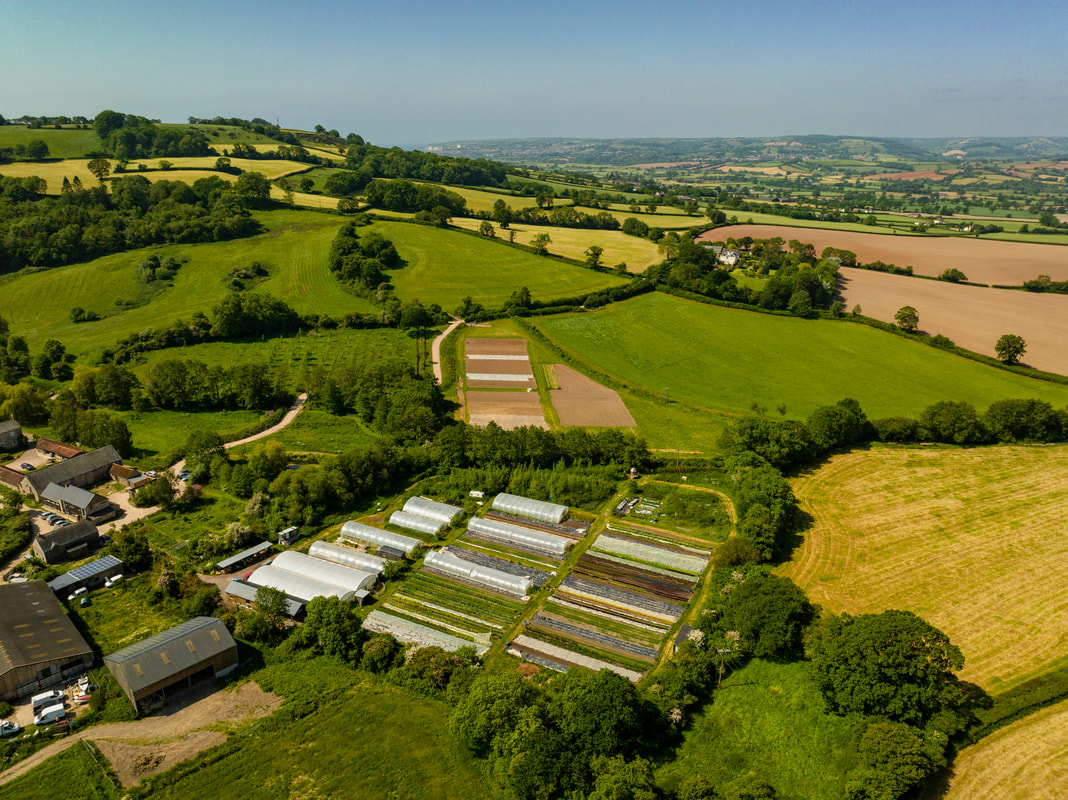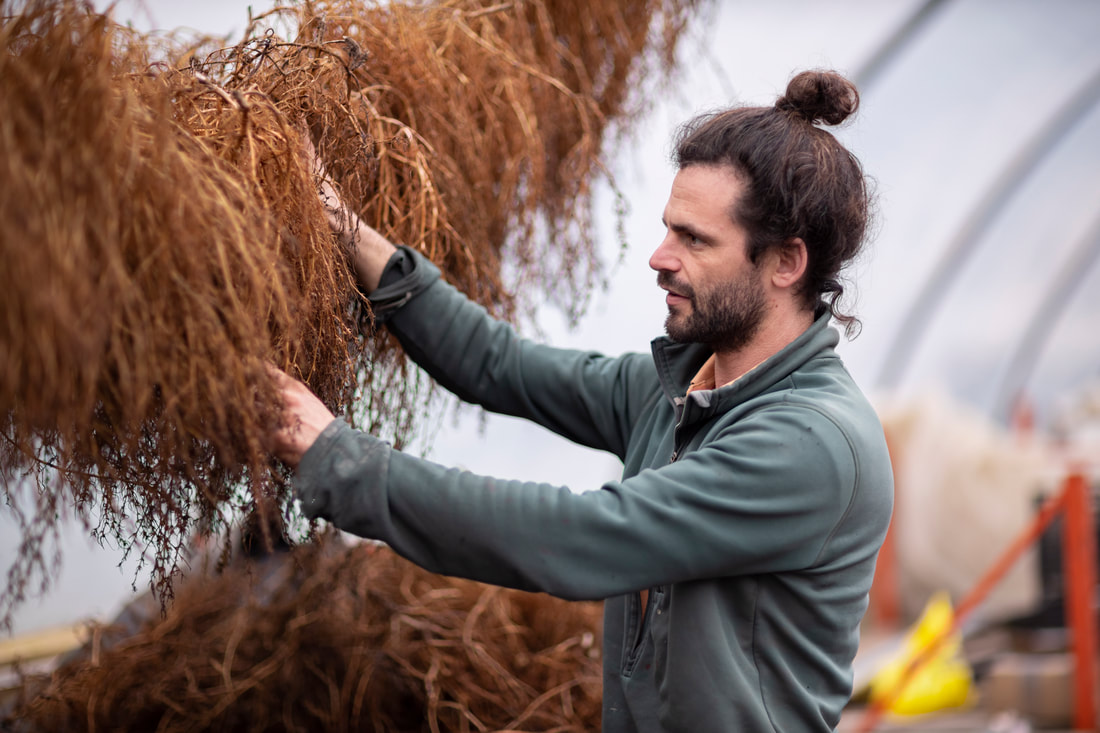|
Last April I quit my job as a research scientist, hung up my lab coat, and moved to Trill Farm Garden to start a season as a trainee grower here. I was totally new to market gardening, but enjoyed it so much that I’m back as a second-year trainee this season. What with a much wetter and sunshine poor spring compared to last year, and conscious decisions to adapt some of the ways we do things in the garden, there’s already a lot of new things to learn and think about. For those interested in how their food is grown, as well as those who like to grow food themselves, we thought we’d share our thoughts on some of these changes. New field, new crops (and green manures) Last year Trill Farm Garden took on an extra 2.5-acre field neighbouring the original market garden, but last season only cultivated a portion of it. This year, with the exception of a patch that will host a long-term green manure, we will be growing veg on most of the field. The motivations for taking on the field were: to be able to grow more seed crops, which in some cases require an isolation distance from other crops of the same species (more on this later); to free up space for more soil-restoring green manures as part of our crop rotations; and to be able to grow more crops for the winter veg boxes ourselves, ensuring these arrive with customers at peak freshness. This year we will be growing many more of our own leeks, squash, corn, drying beans, shallots, potatoes, cabbages, spring greens, and purple sprouting broccoli. We’re looking forward to seeing how all these grow in the new ground, and to experimenting with different green manure mixes sown underneath these crops. As well as annuals, we will also be growing more perennials in the new field. Perennial crops allow us to grow food without disturbing the soil as often, keeping living roots in the ground all year round and providing habitat for overwintering insects. Since perennial crops stay in the ground for longer, they can establish bigger root systems that have more interaction with fungal networks and microbes in the soil, allowing them to access more nutrients from the soil. This may account for the reportedly higher average nutrient density of perennial crops compared to annual (Toensmeier, 2020). Because perennials already have an established root system, some can also crop earlier than annual vegetables in the spring, providing food in the UK’s ‘hungry gap’. On top of all this, many perennial crops are delicious! We are starting off by growing lots more rhubarb, winter savory, oregano, different types of mint, sage and thyme, lovage, garlic chives, and Jerusalem artichokes. Lots more seed crops At Trill Farm Garden we have been experimenting with saving our own seed, as well as growing seed crops commercially for Real Seed Catalogue and Vital Seeds, for years. This is fueled by a desire to claw back seed sovereignty* in the UK, and to improve the availability and diversity of good quality organic seed for farmers and home growers alike. UK-grown seed is also likely to produce plants that are better adapted to our climate here. Last year we grew 9 seed crops, this year with more space and continued motivation we are growing nearly triple that! Each time we grow a new seed crop, it is an exciting opportunity to observe and nurture a plant’s growth right through its life cycle rather than just to the edible vegetative stage. Nurturing our soil biology Over the 13 years since Ash and Kate started Trill Farm Garden, there have been several evolutions in the way that beds have been prepared for growing crops, motivated by a desire to improve the drainage in the heavy clay, high water table market garden, as well as to foster a healthier ecosystem at and below the soil surface. These aims also always had to be balanced with the need for methods to be efficient and sustainable for a small team of people to use over 2.5 acres, year in, year out. This year might be the first year that we do not cultivate a single bed in the market garden, instead using black silage tarps to cover beds and kill off old crops and weeds before re-planting. Our polytunnel beds have always been ‘no dig’, but we are also trying to increase the organic matter in these beds whilst relying less on bought-in compost, and so are mowing down and shredding old crops in place and planting new crops straight through this mulch. In addition to adding organic matter and feeding soil biology, mulches like this help to retain moisture levels during the hot summer months. Inspired by the fascination with soil microbiology of TFG grower Holly Silvester, as well as Korean Natural Farming approaches, under Holly’s excited instruction we have started using more ‘inoculants’ to feed the microbes in our soils. She has built a productive worm farm in a crate, soon to be upgraded to an IBC tank, and we harvest vermicasts (worm poo!) to mix with seaweed, molasses, and comfrey and nettle ferments as a (hopefully) delicious offering to the microbes. Module-grown plants are soaked in this concoction before planting to try and kick off a close and productive relationship between plant root hairs and soil microbes as quickly as possible. We have started foliar feeding our fruiting summer crops that have just been planted out in polytunnels with similar potions to boost their growth, and will be experimenting with more of this, as well as ‘soil soaks’ combined with before-and- after soil testing and electron microscopy (see below!), as the season progresses. We are also trialing a compost extract rich in fungi and nematodes called ‘The Goop’ from the Soil Ecology Lab, treating some dwarf French bean, courgette and cucumber seed with the extract and leaving some untreated for comparison. Stay tuned for some of the results! * Seed sovereignty has been defined as a grower’s right to breed and exchange diverse, open-source seeds, which can be saved and are not patented, genetically modified or owned by one of the four agrochemical companies that control more than 60% of global seed trade. See https://www.theguardian.com/uk- news/2020/dec/28/seed-saving-movement-calls-for-seeds-to-be-publicly-owned Toensmeier, E., Ferguson, R. and Mehra, M., 2020. Perennial vegetables: A neglected resource for biodiversity, carbon sequestration, and nutrition. PLoS One, 15(7), p.e0234611. Written by Julia Spindel who has been training with us for the last two seasons
4 Comments
1/24/2024 09:29:18 pm
How is Trill Farm Garden approaching the start of a new season, and what changes or innovations are being implemented this time around? Greeting : <a href="https://sas.telkomuniversity.ac.id/en/">Telkom University</a>
Reply
2/26/2024 11:46:54 pm
Nice for information
Reply
5/18/2024 03:38:31 am
Nice for information
Reply
5/22/2024 07:15:40 pm
"Could you please provide some insights into the changes we've implemented as we embark on a new season at Trill Farm Garden?"
Reply
Leave a Reply. |
AuthorAshley has been running Trill Farm Garden since 2010 with his partner Kate. Ellen is the Senior Grower and Seed Coordinator at Trill Farm Garden. Archives
July 2024
Categories |



 RSS Feed
RSS Feed